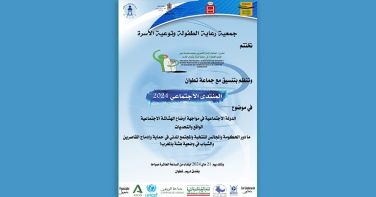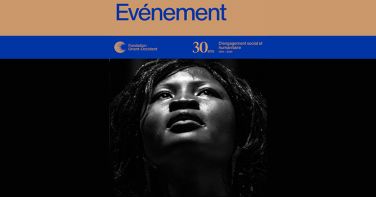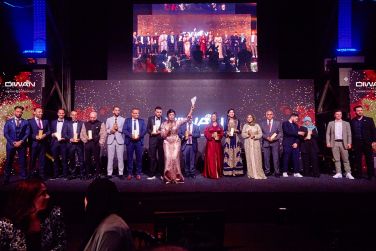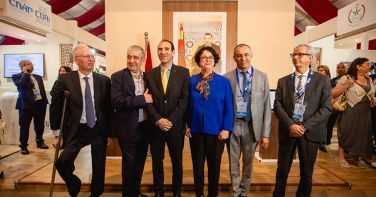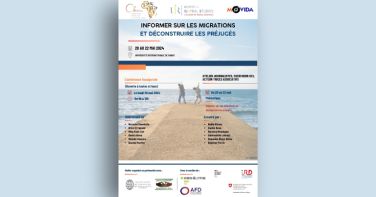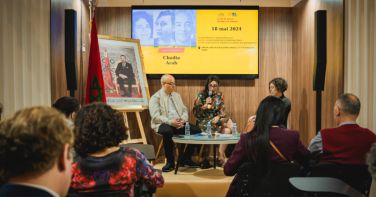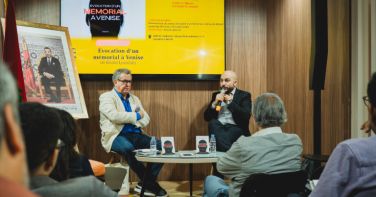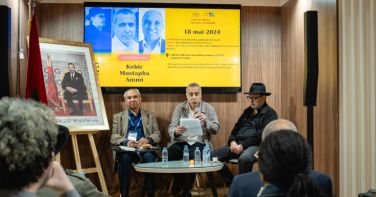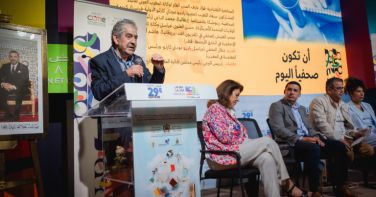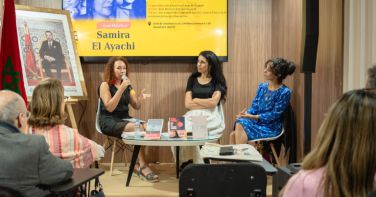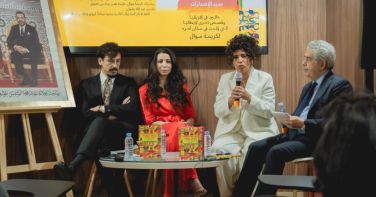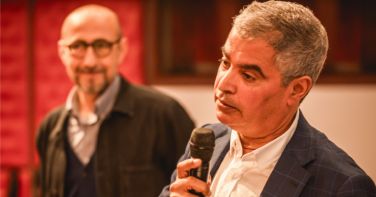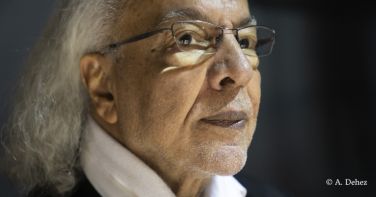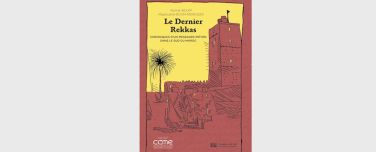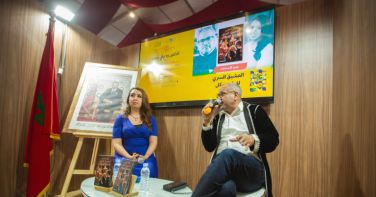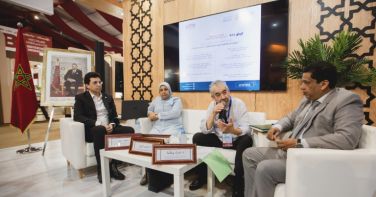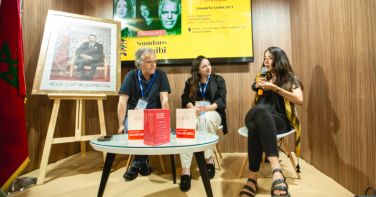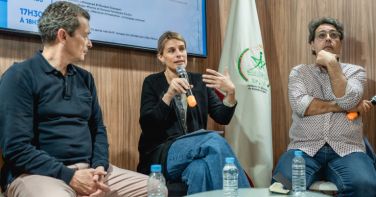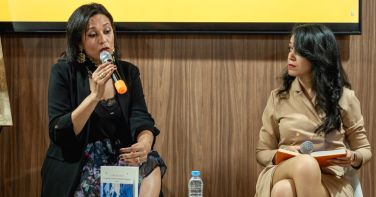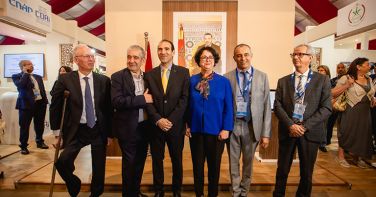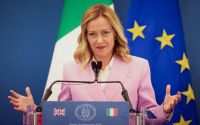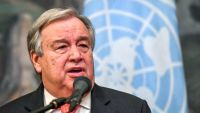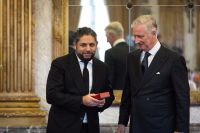A forum exploring means of protecting and integrating Moroccan and migrant minors was held on Tuesday 21 May 2024 in Tetouan, initiated by the Child Protection and Family Awareness Association (APIASF), in cooperation with the municipality of Tetouan.
The President of the Council for the Moroccan Community Abroad (CCME), Mr Driss El Yazami, will be taking part in the 30th anniversary of the Orient-Occident Foundation in Rabat on Thursday 23 May 2024. The Foundation is a Moroccan non-profit organization founded in 1994 and granted public interest status in 1996.
On Saturday 18 May 2024 in Brussels, several Moroccan-Belgian professionals who have distinguished themselves in various areas were honoured at the 11th Diwan Awards, organised in partnership with the Council for the Moroccan Community Abroad (CCME) to reward the excellence of Moroccan-Belgian professionals.
Seven institutions and authorities for good governance and participative democracy close their participation in SIEL 2024
A shared pavilion and a rich record
Rabat, Tuesday 21.5. 2024 - The Economic, Social and Environmental Council (CESE), the Institution of the Mediator of the Kingdom (IMR), the Council of the Moroccan Community Abroad (CCME), the High Authority for Audiovisual Communication (HACA), the Competition Council, the National Authority for Probity, and the National Commission for the Supervision of Personal Data Protection (CNDP) concluded their participation at the 29th edition of the Rabat International Book and Publishing Fair (SIEL) on Sunday 19 May 2024 with a rich and positive outcome.
The joint pavilion hosted 59 meetings and activities and featured some 100 publications from the 7 institutions in Arabic, Amazigh, French, English and Spanish. In addition, publications were exhibited in sign and Braille on the IMR stand. Over 2,600 schoolchildren, students, researchers, journalists, civil servants from government departments and institutions and local authorities, representatives of civil society and the public at large took part and interacted with the 105 guest speakers from Morocco and 9 other countries.
The INPPLC's participation was another opportunity for promoting the values of probity to different audiences and highlighting the progress made in terms of objective knowledge of the phenomenon of corruption, as well as the challenges and prospects of the transition to a new era in preventing and combating corruption. This presence helped to shed light on the Forum's constitutional missions, the strategic reference framework for its action, and the related institutional ecosystem. The Forum also announced the launch of its new institutional portal, the National Integrity Portal and the digital platform for receiving reports of acts of corruption, as part of its efforts to strengthen its interaction with citizens and to ensure institutional convergence and complementarity with other players.
Meanwhile, the EESC focused its involvement in this year's event on sharing and interacting with Fair visitors about its mission, work and activities. At its stand, the EESC displayed a range of its views and reports, and organised meetings on ‘Limiting the spread of fake news’, chaired by the President of the Council, and on ‘Developing the blue economy’ and ‘Promoting reading’, chaired by its members.
On the theme of “The Institution of the Mediator of the Kingdom, an open book for dialogue”, the IMR offered a rich program of communication, including a series of interactive meetings on its constitutional role, its missions, its services and the results of its annual reports. The academic seminars organised have brought to light the institution's roles, particularly in terms of institutional mediation as part of the new public management and the institution's contribution to the evaluation of public policies, its powers and interventions in matters of governance and the regulation of public services, the application of the rule of law and the application of the principles of justice and equity.
The IMR, present on the theme ‘The Institution of the Mediator of the Kingdom, an open book for dialogue’, proposed a rich communication program, including a series of interactive meetings around its constitutional roles, its missions, its services and the results of its annual reports. The academic seminars held highlighted the institution's roles, particularly with regard to institutional mediation in the context of the new public management and the institution's contribution to the evaluation of public policies, its powers and interventions in terms of governance and the regulation of public services, the application of the rule of law and the application of the principles of justice and equity. In addition, staff were mobilised throughout this period to welcome and guide visitors wishing to
The CCME’s program on ‘Writing Morocco; narrating the world’ highlighted the diversity as well as the dynamism of the Literary and intellectual productivity of the Moroccans of the world expressing themselves and writing in the languages of the world. The debates and exchanges, which ranged from novels to the cinema and theatre, addressed current social issues in Morocco and the countries in which they live, focusing in particularly on racism, discrimination, rejection of the other, and migration policies. They provided insights into the challenges to be met and demonstrated the contribution and involvement of these talented people from all walks of life - artists, novelists, researchers, journalists and community workers - in building a better world.
The HACA stand was the scene of intense activity and fostered constructive dialogue with visitors. The program proposed by the institution focused its activities on two major themes: promoting and illustrating the aims of independent media regulation, and raising awareness of the use of audiovisual and digital media. Throughout the ten days of the SIEL, HACA executives led twelve presentations and interactive workshops and supervised the various activities on the stand, using interactive terminals and organising a number of information and outreach sessions for visitors, particularly schoolchildren and young people, focusing mainly on the authority's remit to protect young audiences, promote the right to information, and ensure that national radio and television broadcasters comply with human rights principles.
The Conseil de la concurrence's presence at SIEL 2024 is part of its efforts to reach out to the public and to raise awareness about the importance of the principles of free and fair Competition. This was an opportunity to interact with the public, experts and researchers on competition matters, and introduce the Council's attributions, organization, activities and significant achievements. Besides the presentation of its annual reports and opinions, the Council's stand provided an opportunity to respond to questions from visitors and provide information on its activities in the field of anti-competitive practices, the control of economic mergers, complaints, referrals on its own initiative and its consultative activities.
The CNDP's attendance at the event was another opportunity to present the CNDP's missions and values to the wider public. Citizens of all ages from across the Kingdom attended the Council's stand, allowing them to ask any questions they might have about the institution, and the rights guaranteed to data subjects by Law 09-08 and the obligations of data controllers under the law. Likewise, the ‘DATA-TIKA’ program was presented, demonstrating the CNDP's commitment to helping public institutions, businesses, associations and NGOs and their ecosystems to comply with personal data protection legislation. In parallel, the CNDP has put in place a wide-ranging and rich program focusing on the protection of personal data and privacy, including lectures organised for the benefit of citizens and interactive workshops targeting children/teenagers.
The Movida LMI and the Center for Global Studies at Rabat International University (UIR) are organising a workshop from 20 to 22 May 2024, in partnership with the Collectif des communautés subsahariennes au Maroc (CCSM) and the Réseau Marocain des journalistes des Migrations (RMJM), on how to provide information on migration and deconstruct prejudices and preconceptions.
The conference discussed the issue of how death is dealt with within the context of immigration, both in terms of immigrants losing their lives while attempting to cross the border to Europe, as well as the bodies of immigrants living abroad or descendants of immigrants, the procedures and rituals that follow death.
Siel-CCME: On Friday 17 May 2024, writer, speaker and engineer Khalid Lyamlahy was welcomed by the Council of the Moroccan Community Abroad (CCME) for a presentation of his novel "Evocation d'un mémorial à Venise.
He replied to questions from Younès Ajarraï, actor and cultural entrepreneur.
‘’What if we made arts and literature the bedrock of our horizon‘’ is the theme of the ‘’carte blanche‘’ meeting held by the Council of the Moroccan Community Abroad (CCME) during its attendance at the Rabat Book Fair. On Saturday 18 May 2024, the French-Moroccan dramatist and novelist Kebir Mustapha Ammi was joined by two of Morocco's leading cultural figures, the artist Fouad Bellamine and Driss Khrouz, former Director of the National Library of the Kingdom of Morocco and Director General of the Esprit de Fès Foundation and the Festival of Sacred Music.
CCME-Siel: A conference entitled “Being a journalist today”, initiated by the Club des journalistes accrédités au Maroc in partnership with the Council for the Moroccan Community Abroad (CCME), was held on May 17 at the Rabat book fair.
"Our bodies as battlefields: writing in the era of the feminist and humanist revolution" was the theme of the second round-table discussion organised by the Council of the Moroccan Community Abroad (CCME) at the Rabat Book Fair on Thursday 16 May 2024. A free discussion led by the French-Moroccan novelist Samira El Ayachi together with her guests,Rim Battal, a Moroccan poet and journalist living in France, and Fatima Ouassak, a French-Moroccan political scientist and lecturer.
On Wednesday May 15, 2024, as part of the Council of the Moroccan Community Abroad (CCME) program at the Rabat Book Fair, the Council's joint pavilion hosted Italian-Moroccan journalist Karima Moual, who introduced her book Cold in Italy and other stories of an Italy born elsewhere”, published by Luiss University (Rome).
The Renaissance cinema in Rabat hosted on the evening of 14 May 2024 the premiere of the 90-minute documentary "Mora est là", directed by Khalid Zaïri, a partnership between the Council of the Moroccan Community Abroad, the Hiba Foundation and the 2M TV channel.
On Wednesday 15 May 2024, the Council of the Moroccan Community Abroad (CCME) and the Cercle des Lauréats de Belgique (CLB), in partnership with the Délégation Générale Wallonie-Bruxelles au Maroc, paid tribute to the late Lahcen Zinoun, dancer, choreographer, writer, director and film-maker, at the Café de la Scène in Rabat (1st floor of the Cinéma Renaissance).
Omar Boum, a Moroccan anthropologist based in the United States and member of the Académie du Royaume, will be presenting his book "Le dernier Rekkas" (The Last Rekkas) on Friday 17 May 2024 at 6.30pm at the "Kitab" space of the Rabat Book Fair. "Le dernier Rekkas" is co-published by the CCME and the Langages du sud publishing house, and prefaced by Mr Driss El Yazami, President of the CCME.
"Mrs Merkel's secret lover" (in Arabic) by the German-Moroccan writer and journalist Rim Najmi-recently published by Dar Al-Masriah Al-Lubnaniah-was presented on Monday 13 May 2024 at the CCME stand. The author answered questions from German-Moroccan producer and journalist Mohamed Massad.
On Monday 13 May 2024, the President of the Council for Moroccan Community Abroad (CCME), Driss El Yazami, took part in a round table at the Ministry of Justice Pavilion of the Rabat Book Fair on the theme: ‘Justice in the service of Moroccans living abroad’. Mrs Zahira Fountir, Law Professor at Mohammed V University in Rabat and member of the National Council of Human Rights (CNDH), Mr. Saïd Rachik, in charge of studies and media relations at the Kingdom's Ombudsman, and Mr Mbarek Boutelha, Head of the Department of international management mechanisms in the field of civil law at the Department of Civil Affairs and the Legal and Judicial Professions, also took part in the meeting.
The CCME pavilion at the Rabat Book Fair on Sunday May 12, 2024 hosted a panel of two artists, novelist Hajar Azell (France) and filmmaker Hakim Belabbes (USA), who answered journalists Soundouss Chraïbi's questions on extending identity into artistic spaces.
The guests tried to describe their experience of the "in between", a state of mind " full of blur and constant movement back and forth, one foot towards oneself, and one foot towards the outside world". By creating in writing or film, Hakim Belabbes and Hajar Azell naturally embrace this movement "and see their native culture floating in their thoughts".
For Hajar Azell, the act of writing requires not only an emotional commitment, but also an intellectual one, since "there's a political dimension to it that you have to be aware of in order to create a new reality". She associates her identity, "which is not something static, with space, a parameter that is continuously changing, so as to be able to tell unhappy stories in cheerful words, because by changing space, we change both our backgrounds and our emotions".
For his part, director Hakim Belabbes describes filmmaking as a way of breaking free from harsh reality.
When he moved to the United States, he thought he was simply changing his social status, but as he evolved, he came to realize that he "will never be the same person who left, and the reality he wanted to change was his main source of inspiration".
The richness and diversity of his Moroccan culture is the principal hallmark of his "unique voice and imprint", expressed in the most basic gestures of his profession: "even the field of my camera shots was deeply inspired by the culture I come from".
CCME
A meeting on the theme: "Morocco and Spain. Literature and translation: a universal language" was held on Saturday 11 May 2024 at the Pavillon commun. The event was held to coincide with the 29th session of the Rabat International Book Fair and the activities of the Council of the Moroccan Community Abroad. Moroccan-Spanish author Mohamed El Morabet was the guest speaker at "Une Carte blanche", an open discussion featuring Rocío Rojas Marcos, writer and professor in the Department of Arabic and Islamic Studies at the University of Seville, and Gonzalo Fernández Parrilla, professor of Arabic and Islamic Studies at the Autonomous University of Madrid.
This event examined various aspects of literature and translation between Morocco and Spain, and analysed the literary genres being translated in an attempt to identify ways of bringing together the cultures of both countries.
The participants insisted on the importance of translation in order to inscribe the text in the culture from which it was translated. An act likely to breach barriers across nations, allowing each culture to join the world literature competition. The authors cite the case of Kalila wa Dimna, which, thanks to translation, has now become an integrated part of the Spanish culture, as "local literature is written by authors, while international literature is written by translators", a statement by the writer José Saramago, quoted by
Gonzalo Parilla. Rocío Rojas Marcos stressed that without translations it would not be possible to know the Other, just as modern Europe could not have made itself known without the Arabic translations in the Middle Ages.
Mohamed Choukri in the footsteps of Don Quichotte?
In his address, Mohamed El Morabet compared Don Quichotte's role as a Spanish literary heritage in Moroccan culture with the absence of a literary figure of this magnitude in the Spanish imagination. In analysing this observation, both Spanish academics felt that the Moroccan literary figure closest to the Spanish is the character of Mohamed Choukri, who brought the Spanish public into closer contact with Moroccan culture thanks to the strength of his literature and his narrative. However, Mohamed Choukri's works were translated into French before they were translated into Spanish, which raises another literary issue between Morocco and Spain linked to the language
of translation.
transmitting Moroccan works to the Spanish public can change certain cultural contents, since they pass through a different filter depending on the translator.
Although Gonzalo Fernández Parrilla believes that this is due to the complexity of translating from Arabic into Spanish, Rocío Rojas Marcos believes that this historical observation is above all linked to Spain's position in Europe, which leads it to orient its cultural perspective more towards the countries of its continent than towards Morocco, preferring to translate Moroccan works published in France rather than works from Morocco.
And what about writers of Moroccan origin in Spain?
According to Gonzalo Fernández Parrilla, Spanish writers of Moroccan descent have reflected the concerns of the community: the literature produced in the Spanish language by writers of Moroccan origin that has emerged over the last two decades was initially characterised by its concern with issues of identity, rootedness and integration in the host country. A trend from which Moroccan writers in Spain quickly 'freed themselves', once these subjects had been assimilated and more or less overcome, to give way to different subjects.
What about writers of Moroccan origin in Spain?
According to Gonzalo Fernández Parrilla, Spanish writers of Moroccan origin have reflected the concerns of the community: the literature produced in the Spanish language by writers of Moroccan origin that has emerged over the last two decades was initially characterised by its interest in issues of identity, rootedness and integration in the host country. A trend from which Moroccan writers in Spain quickly 'freed themselves', once these subjects had been assimilated and more or less overcome, to give way to different subjects.
A "natural" development for Rocío Rojas Marcos, who believes that in "any literary work, the author first seeks to explain his position within the new society". Mohamed El Morabet doesn't share this view: "As a Moroccan writer in Spain, I don't know in advance what I'm going to write about or what subject I'm going to write about; I write as part of a constant search for a subject".
CCME
The Council of the Moroccan Community Abroad (CCME) hosted the French-Moroccan writer Leila Bahsaïn on Saturday 11 May 2024 at the joint pavilion of the Book Fair in Rabat. Leila Bahsaïn presented her latest book ‘Ce que je sais de Monsieur Jacques’, published by Albin Michel, to an audience. Ghita Zine interviewed her.
At a press conference on Friday 10 May 2024, the Council of the Moroccan Community Abroad (CCME) was joined by six other constitutional institutions, with which it is sharing a common pavilion for its 15th participation in the International Book and Publishing Fair (SIEL).
Speaking to the media at the event, CCME President Mr. Driss El Yazami explained that the purpose of having seven institutions in one pavilion is to present the work of each institution separately, and inform the public about the missions of each institution, as well as its scientific and cultural achievements and the way it operates.
The Council of the Moroccan Community Abroad (CCME), the Economic, Social and Environmental Council (CESE), the Institution of the Mediator of the Kingdom (IMR), the High Authority for Audiovisual and Communication (HACA), the Competition Council (CC), the National Authority for Ethics, the Prevention of and Combat against Corruption, and the National Commission for the Supervision of Personal Data Protection (CNDP), are sharing a common pavilion at this edition.
The 29th edition of SIEL is being organised by the CCME under the title "Writing Morocco, Narrating the World", a program featuring around 60 guests from ten countries, including Morocco, which reflects the creativity of Moroccans abroad, the emerging generation of young Moroccans and the significant contribution being made by Moroccan women in all spheres of creativity: literature, cinema, theatre, etc. These works are the result of a melting pot of cultures from countries of origin and immigration, enhancing the collective intellectual capital of Morocco and of host countries.
CCME
- Banque du Maroc is negotiating with its French and Spanish counterparts over Moroccan remittances
- Meloni relance l’offensive contre l’immigration lors du sommet européen
- China Grants Moroccan Scientist Rachid Yazami Lithium Batteries Patent
- Migrants Day: Secretary-General Guterres calls for safe and more humane migration
- Ayman Ramdani, the founder of NGO Play4Peace, decorated by the Belgian King (Play4Peace press release)

